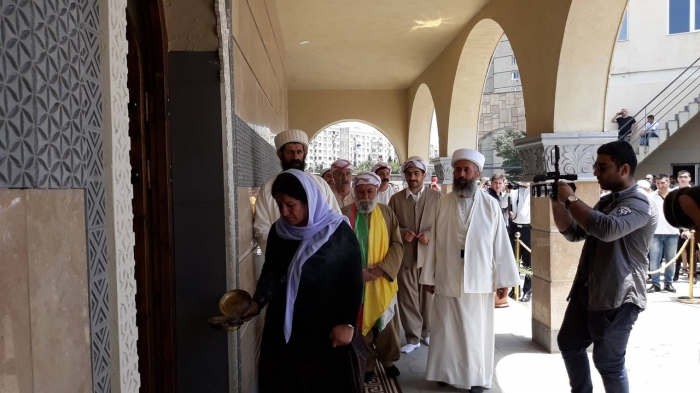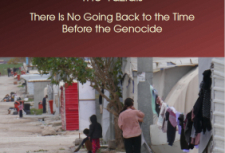Is the Yazidi community of Georgia on the verge of extinction?

In the analysis of the identity of the so-called "Kurdish-Yazidis" or "Yazidis" of the post-Soviet space (before the collapse of the USSR mainly concentrated on the territory of Armenia and Georgia), there is an insurmountable complexity of their collective designation. The terms "Kurd-Yezidi", and also "Kurd" and "Yezidi" collectively refer to people living on the territory of Georgia and Armenia who emigrated from their territories or whose ancestors once belonged to the Yazidi religion, are rather conditional. This fact points to the multi-variant identity of the so-called "Yazidi community". At the same time, some types of this identity are currently being formed.
Often you can hear such a combination of words as "Kurds-Yezidis". Today, many public figures insist that the Yazidis and Kurds are not one people, other natives of such families identify themselves only as Kurds. A number of public organizations have the word "Kurdish" in their name, and others — "Yazidi". For example, the vast majority of the so-called "Yazidi Kurds" of Georgia identify themselves as "Yazid" and not "Kurd". Study of the situation of the Yazidis, as representatives of one of the numerous ethnic minorities living in Georgia is important, firstly, due to the fact that the Yazidis have no independent national-autonomous entities, and secondly, due to the fact that in Iraq, ISIS militants have killed thousands of Yazidis, which, in turn, should be subject to proper attention.
The collapse of the USSR significantly affected the life of the Yazidi community in Georgia. This was expressed in the fact that the middle Eastern communities of Yazidis began to establish contacts with the Yazidi Diaspora of Georgia. Today, in the conditions of permanent tension in the middle East, the Diaspora of "Kurd-Yazidis" can gain more weight in the context of possible geopolitical changes. However, the issue of "Yazidi Kurds" is not exclusively a problem for the countries of the Middle East. Thus, it is important to study the problems faced by Yazidis living in Georgia.
Yazidis (ezdi's self-name) are an ethno-religious community. Their number according to the data in need of clarification, reaches 1 million people. They mostly live in their homeland in Northern Iraq (near Shahan, the surrounding area of Dohuk, and in the mountains of Sinjar), there are also communities in Syria (governorate of El-Hasaka, Qamishli, Afrin), Turkey (in the vicinity of Siirt, Mardin, Nisibin, Weerasekera) Yezidis left a small amount. One of the most numerous Yazidi communities was in the USSR (Armenia and Georgia), after the collapse of which some of them moved to Russia, Ukraine and Western Europe.
In Georgia, Yazidis mainly live in Tbilisi (more than 90%). Since Georgia gained independence, the number of Yazidis began to decline: from 33 thousand (in 1989) up to 20-22 thousand (2002 data) and up to 12 thousand people (2014 census). The native language of the Yazidis is Kurmanji (classified as the Northern Kurdish language, an Iranian group), in which there is a rich religious poetry, i.e. sacred texts (kavla and beita), which are a source for the study of religion. Despite the fact that the Yazidis speak Kurmanji, for centuries they formed a separate identity based on religion. They developed a special stereotype of behavior, became a closed community of caste-theocratic system, which was historically due to the persecution of followers of yazidism by radical followers of Islam. According to available data, the first Kurds came to Georgia during the reign of king George III in the second half of the XII century (later, some of them began to serve the Georgian king), and in the middle of the XVIII century there were the first contacts between the Georgian kings and Yazidis leaders. In the XX century the representatives of the Yazidi intellectuals increasingly began to identify.
Main organizations and centers of "Kurds-Yezidis" in Georgia
At the moment only two public Yezidi organizations, the "House of Yezidis of Georgia" and the "Spiritual Council of Yezidis in Georgia" are functioning in Georgia. The first Kurdish organization in Georgia was – “Ronai", it was established in 1988. Later, the organization was renamed the "Union of Kurdish citizens of Georgia", and then, in 1998, the "Union of Yezidis Of Georgia" (this organization received financial support from the German Embassy in Georgia), "Union of Yezidis youth of Georgia", "Center of Kurdish culture", etc. However, due to the lack of stable funding, most of these organizations are currently either not functioning or have ceased to exist. During the 1990s, there was a tendency for PKK (Kurdistan workers Party) functionaries to infiltrate Georgia in order to promote their ideas and attract new members to their ranks. However, attempts to establish ties with local Yazidis were not particularly successful. Yazidi organizations in Georgia are politically neutral and at the same time quite active in terms of civic participation, interethnic and inter-confessional relations. They are acting members of the Council of tolerance under the Public defender of Georgia.
The Yazidi community-based organizations in Georgia is characterized by the following features:
- apolitical (i.e. conscious non-participation in the policy of the country, which according to the leaders of the Yazidis takes precious time, which should be spent primarily on the preservation and revival of the Yazidis community and solve the urgent problems facing it);
- loyalty to the country of residence (no claim to the autonomy of the regions and areas of residence);
- peaceful coexistence with other faiths.
From the above it follows at least two conclusions:
First, the Yezidi community has no representatives in the echelons of power. They do not play a prominent role in the political life of the state. Secondly, while almost the entire population of the country is very concerned about the problem of migration, Yazidis fear that their community may disappear. On the other hand, if Georgia gets stronger economically, there may be a reverse trend – the return of many of those Yazidis who had previously left Georgia.
At this stage, there is no doubt that the Yezidi community of Georgia is on the verge of extinction. Unlike Iraq, where they are subjected to all kinds of discrimination, Yazidis live freely in Georgia. However, the degree of migration of Yazidis will still depend on the specific socio-political situation in Georgia itself, as well as on the geopolitical realities in the region.
Events in Iraq and the Yazidis genocide caused a massive outflow of civilians from their homes – it is believed that since the beginning of the fighting against the Yazidis by ISIS, refugees inside the country were about 400 thousand people, and more than 100 thousand Yazidis left Iraq. In this period from Iraq to Georgia arrived about 70-100 Yazidis. Today, however, almost all of them emigrated to Europe or returned back to their native land.
Some conclusions:
- The issue of self-identification of Yazidis is one of the most acute problems. Today, there is no consensus among scientists on the issue of self-identification as a "Kurd" or "Yazid".
- If Yazidis commemorate with a kind word social party in the Soviet Union, the Yazidi identity was badly damaged, as was the official kurdification of Yazidis.
- Yazidis of Georgia have some problems with preservation and education in their native language. The reason for this is primarily the lack of specialists of Kurmanji, as well as the lack of literature in their native language. When communicating with other ethnic groups, Yazidis primarily speak Georgian or Russian, but priority is given to the Georgian language. But despite this situation, Georgia has created the best conditions for Yazidis to preserve their religion and culture. In modern Georgia, they have the right to identity, which was expressed in the indication of the column "Yazidis" in the census of 2014.
-The main factor hindering the development of Yazidi cultural life for many years was the lack of funding. The state at that time was not able to Finance the cultural activities of the Yazidis or any other national minorities. Certain economic funds could be raised only within the Yazidi Diaspora itself. This situation has been improved considerably in recent years.
Tags:
Is the Yazidi community of Georgia on the verge of extinction?

In the analysis of the identity of the so-called "Kurdish-Yazidis" or "Yazidis" of the post-Soviet space (before the collapse of the USSR mainly concentrated on the territory of Armenia and Georgia), there is an insurmountable complexity of their collective designation. The terms "Kurd-Yezidi", and also "Kurd" and "Yezidi" collectively refer to people living on the territory of Georgia and Armenia who emigrated from their territories or whose ancestors once belonged to the Yazidi religion, are rather conditional. This fact points to the multi-variant identity of the so-called "Yazidi community". At the same time, some types of this identity are currently being formed.
Often you can hear such a combination of words as "Kurds-Yezidis". Today, many public figures insist that the Yazidis and Kurds are not one people, other natives of such families identify themselves only as Kurds. A number of public organizations have the word "Kurdish" in their name, and others — "Yazidi". For example, the vast majority of the so-called "Yazidi Kurds" of Georgia identify themselves as "Yazid" and not "Kurd". Study of the situation of the Yazidis, as representatives of one of the numerous ethnic minorities living in Georgia is important, firstly, due to the fact that the Yazidis have no independent national-autonomous entities, and secondly, due to the fact that in Iraq, ISIS militants have killed thousands of Yazidis, which, in turn, should be subject to proper attention.
The collapse of the USSR significantly affected the life of the Yazidi community in Georgia. This was expressed in the fact that the middle Eastern communities of Yazidis began to establish contacts with the Yazidi Diaspora of Georgia. Today, in the conditions of permanent tension in the middle East, the Diaspora of "Kurd-Yazidis" can gain more weight in the context of possible geopolitical changes. However, the issue of "Yazidi Kurds" is not exclusively a problem for the countries of the Middle East. Thus, it is important to study the problems faced by Yazidis living in Georgia.
Yazidis (ezdi's self-name) are an ethno-religious community. Their number according to the data in need of clarification, reaches 1 million people. They mostly live in their homeland in Northern Iraq (near Shahan, the surrounding area of Dohuk, and in the mountains of Sinjar), there are also communities in Syria (governorate of El-Hasaka, Qamishli, Afrin), Turkey (in the vicinity of Siirt, Mardin, Nisibin, Weerasekera) Yezidis left a small amount. One of the most numerous Yazidi communities was in the USSR (Armenia and Georgia), after the collapse of which some of them moved to Russia, Ukraine and Western Europe.
In Georgia, Yazidis mainly live in Tbilisi (more than 90%). Since Georgia gained independence, the number of Yazidis began to decline: from 33 thousand (in 1989) up to 20-22 thousand (2002 data) and up to 12 thousand people (2014 census). The native language of the Yazidis is Kurmanji (classified as the Northern Kurdish language, an Iranian group), in which there is a rich religious poetry, i.e. sacred texts (kavla and beita), which are a source for the study of religion. Despite the fact that the Yazidis speak Kurmanji, for centuries they formed a separate identity based on religion. They developed a special stereotype of behavior, became a closed community of caste-theocratic system, which was historically due to the persecution of followers of yazidism by radical followers of Islam. According to available data, the first Kurds came to Georgia during the reign of king George III in the second half of the XII century (later, some of them began to serve the Georgian king), and in the middle of the XVIII century there were the first contacts between the Georgian kings and Yazidis leaders. In the XX century the representatives of the Yazidi intellectuals increasingly began to identify.
Main organizations and centers of "Kurds-Yezidis" in Georgia
At the moment only two public Yezidi organizations, the "House of Yezidis of Georgia" and the "Spiritual Council of Yezidis in Georgia" are functioning in Georgia. The first Kurdish organization in Georgia was – “Ronai", it was established in 1988. Later, the organization was renamed the "Union of Kurdish citizens of Georgia", and then, in 1998, the "Union of Yezidis Of Georgia" (this organization received financial support from the German Embassy in Georgia), "Union of Yezidis youth of Georgia", "Center of Kurdish culture", etc. However, due to the lack of stable funding, most of these organizations are currently either not functioning or have ceased to exist. During the 1990s, there was a tendency for PKK (Kurdistan workers Party) functionaries to infiltrate Georgia in order to promote their ideas and attract new members to their ranks. However, attempts to establish ties with local Yazidis were not particularly successful. Yazidi organizations in Georgia are politically neutral and at the same time quite active in terms of civic participation, interethnic and inter-confessional relations. They are acting members of the Council of tolerance under the Public defender of Georgia.
The Yazidi community-based organizations in Georgia is characterized by the following features:
- apolitical (i.e. conscious non-participation in the policy of the country, which according to the leaders of the Yazidis takes precious time, which should be spent primarily on the preservation and revival of the Yazidis community and solve the urgent problems facing it);
- loyalty to the country of residence (no claim to the autonomy of the regions and areas of residence);
- peaceful coexistence with other faiths.
From the above it follows at least two conclusions:
First, the Yezidi community has no representatives in the echelons of power. They do not play a prominent role in the political life of the state. Secondly, while almost the entire population of the country is very concerned about the problem of migration, Yazidis fear that their community may disappear. On the other hand, if Georgia gets stronger economically, there may be a reverse trend – the return of many of those Yazidis who had previously left Georgia.
At this stage, there is no doubt that the Yezidi community of Georgia is on the verge of extinction. Unlike Iraq, where they are subjected to all kinds of discrimination, Yazidis live freely in Georgia. However, the degree of migration of Yazidis will still depend on the specific socio-political situation in Georgia itself, as well as on the geopolitical realities in the region.
Events in Iraq and the Yazidis genocide caused a massive outflow of civilians from their homes – it is believed that since the beginning of the fighting against the Yazidis by ISIS, refugees inside the country were about 400 thousand people, and more than 100 thousand Yazidis left Iraq. In this period from Iraq to Georgia arrived about 70-100 Yazidis. Today, however, almost all of them emigrated to Europe or returned back to their native land.
Some conclusions:
- The issue of self-identification of Yazidis is one of the most acute problems. Today, there is no consensus among scientists on the issue of self-identification as a "Kurd" or "Yazid".
- If Yazidis commemorate with a kind word social party in the Soviet Union, the Yazidi identity was badly damaged, as was the official kurdification of Yazidis.
- Yazidis of Georgia have some problems with preservation and education in their native language. The reason for this is primarily the lack of specialists of Kurmanji, as well as the lack of literature in their native language. When communicating with other ethnic groups, Yazidis primarily speak Georgian or Russian, but priority is given to the Georgian language. But despite this situation, Georgia has created the best conditions for Yazidis to preserve their religion and culture. In modern Georgia, they have the right to identity, which was expressed in the indication of the column "Yazidis" in the census of 2014.
-The main factor hindering the development of Yazidi cultural life for many years was the lack of funding. The state at that time was not able to Finance the cultural activities of the Yazidis or any other national minorities. Certain economic funds could be raised only within the Yazidi Diaspora itself. This situation has been improved considerably in recent years.
Tags:

























